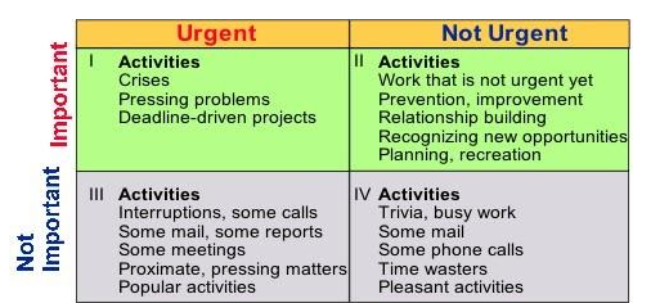Introduction: Establishing Priorities
“Your priorities determine your progress.” --- Mike Tully
“Lack of direction, not lack of time, is the problem. We all have twenty-four hour days.” --- Zig Ziglar
Think about all of the roles you play in life. How many life roles do you have? Obviously, you’re a college student since you’re taking this class. What else is going on in your life? Do you work? Do you have children? Do you care for older parents or grandparents? Do you have a spouse or partner? Are you responsible for running a household? All of these life roles come with demands upon your time. We often get overwhelmed when all of the demands in all of our life roles pile up, and we cannot see how we’re going to accomplish everything we need to do.
The key to avoiding this sense of overwhelm is to prioritize our life roles and the tasks we’re expected to do in each of our life roles. We cannot accomplish everything all at once, and not all of the expectations are as important as others depending on the life role and/or timing of the task. We need to be aware of our priorities, and becoming aware of priorities means knowing what motivates us and what goals we have, two topics addressed elsewhere in this text.
5.1 Quadrant II Time Management System from Stephen Covey
Stephen Covey, a business and management consultant who wrote a book entitled The Seven Habits of Highly Effective People, explained a prioritizing system entitled the “Quadrant II Time Management System.”22
Our activities can be divided into four quadrants:
-
Important and Urgent (I)
-
Important and Not Urgent (II)
-
Not Important and Urgent (III)
-
Not Important and Not Urgent (IV)
Let’s start with examining the “urgent” part of these labels. Urgency refers to the timing of a task in terms of when the task needs to be completed. Is there a deadline or not? Is the deadline soon or far off in the future? Most people may have a common definition of urgency: something is urgent if the timeframe is short.
The definition of “important,” on the other hand, will vary, and we may not have a common sense of what’s important. You are the one who determines importance based on your life roles and goals. What’s important to you one day in one life role may be less important on another day in another life role. Also, what’s important to you may not be important to others and vice versa.

“Four Quadrants”, by Brian Cook is licensed under CC BY-NC 4.0
If a task is important in your life role, and the timeframe for completing that task is short, that task probably would fall into Quadrant I for you. Some examples in the life role of a college student might include finishing a paper that is due tomorrow or practicing a speech to be given in two days. If a task is important in your life role, but you have plenty of time to accomplish the task, you’re operating in Quadrant II. Examples include studying for an exam that is scheduled a week from now or starting an outline for a research project that’s due in several weeks.
If a task isn’t important to your life role, but the timeframe is short or there is a close deadline, that task will be Quadrant III for you. This quadrant can be a little confusing because many people ask “how can something that’s not important be urgent?” Remember the difference between relevance to your life role vs. timing. Often Quadrant III is where other people are operating in or influencing our lives. An example might be a neighbor asking you for a favor that has to happen today, but that favor has no importance in your life.
Finally, tasks that aren’t important in your life roles and don’t have deadlines fall into Quadrant IV. Examples might include mindlessly watching TV or gaming for an excessive amount of time when you’re not a professional gamer. While we do need to relax and have some down time in our lives, the most rewarding down time comes from doing meaningful activities such as hobbies or spending time with important people in our lives which actually falls into Quadrant II rather than IV.
22 Covey, S. (1989). The seven habits of highly effective people: Powerful lessons in personal change. Simon and Schuster.




